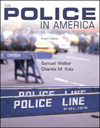 |  The Police in America, 4/e Samuel Walker,
University of Nebraska
Charles M. Katz,
Arizona State University-West
Police Problems Police-Community Relations
Chapter Overview| Conflict between the police and racial and ethnic minority communities is one of the most serious issues facing American policing. One of the primary means to mitigate tensions between the police and minority communities has been the creation of police-community relations (PCR) programs. This chapter provides an in-depth discussion of the nature of PCR with a specific emphasis on police and minority interactions.
First, the chapter introduces students to the relationship between various racial and ethnic minority groups and the police. Next, research on public opinion about the police and police perceptions of citizens is provided. Third, the author gives an overview of police field practices that contribute to the nature of PCR. For example, deadly and physical force, arrests and traffic stops have long been sources of conflict between the police and public. The chapter concludes with a discussion on police employment practices and suggestions for improving PCR. |
|



 2002 McGraw-Hill Higher Education
2002 McGraw-Hill Higher Education